Search Results
Showing results 21 to 40 of 40

Dinosaur Homes
Source Institutions
In this activity about dinosaurs and survival, learners use scrap materials to create a miniature dinosaur habitat that includes a food source, water source, and shelter.

Work Up An Appetite
Source Institutions
In this activity, learners participate in fun movement activities while playing on a giant game board. Use this activity to get learners involved in physical activity.
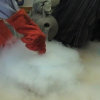
Nano Ice Cream
Source Institutions
In this activity/demo, learners discover how liquid nitrogen cools a creamy mixture at such a rapid rate that it precipitates super fine grained (nano) ice cream.

Homemade Play Dough
Source Institutions
In this sensory activity, young learners explore chemical reactions by making their own play dough from home.
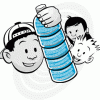
Go With the Flow
Source Institutions
In this activity, learners will observe laminar and turbulent flow of water using only a plastic bottle, liquid hand soap, food coloring and water.
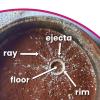
Make An Impact
Source Institutions
In this hands-on activity, learners simulate the crashing and smashing of a meteor impact using household cooking supplies.
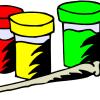
Salt Painting
Source Institutions
In this art meets chemistry activity, early learners discover the almost magical absorbent properties of salt while creating ethereal watercolor paintings.
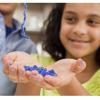
Exploring Fabrication: Gummy Capsules
Source Institutions
In this activity, learners make self-assembled polymer spheres.
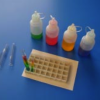
The Liquid Rainbow
Source Institutions
Learners are challenged to discover the relative densities of colored liquids to create a rainbow pattern in a test tube.
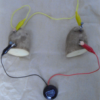
Making a Battery from a Potato
Source Institutions
In this electrochemistry activity, young learners and adult helpers create a battery from a potato to run a clock.
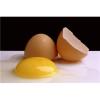
Protect That BRAIN!: Mr. Egghead
Source Institutions
This activity demonstrates the importance of wearing a helmet to protect the brain. An egg is used to symbolize a head with the shell as the skull and the inside of the egg as the brain.
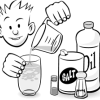
Make a Salt Volcano (Lava Lite)
Source Institutions
This activity about density provides instructions for making a miniature "lava lite" with just salt, oil, water, and food coloring.
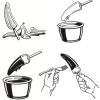
T. rex Cretaceous Treat
Source Institutions
In this activity, learners make edible T. rex teeth (with adult assistance). The treat is a white and dark chocolate covered banana on a stick.

Bubble Bomb
Source Institutions
Learn about chemical reactions by making a Bubble Bomb, a plastic bag you can pop with the power of fizz.
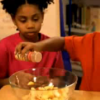
Applesauce
Source Institutions
In this "Sid the Science Kid" activity from Episode 109: The Perfect Pancake, learners make applesauce to explore irreversible change.
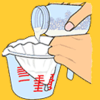
Say Cheese!
Source Institutions
Create a chemical reaction that makes cheese! This hands-on activity demonstrates that molecules and atoms are tiny particles that make up everything around us.

Gummy Shapes
Source Institutions
In this activity, learners use chemistry to “self-assemble” gummy shapes. Learners discover that self-assembly is a process by which molecules and cells form themselves into functional structures.
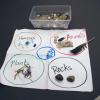
Beach Buckets
Source Institutions
In this activity, learners explore a bucket of sand and beach objects.
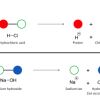
Chemical Identification
Source Institutions
In this activity, learners discover how a cabbage juice indicator helps identify acids and bases, and how iodine indicates the presence of starch.
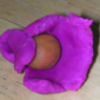
Atoms and Matter (K-2)
Source Institutions
In this activity, learners explore atoms as the smallest building blocks of matter. With adult help, learners start by dividing play dough in half, over and over again.
